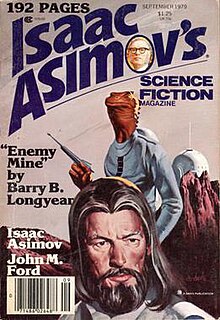Enemy Mine (novella)

"Enemy Mine" is a science fiction novella by American writer Barry B. Longyear. It was originally published in the September 1979 issue of Isaac Asimov's Science Fiction Magazine. The novella's plot concerns two soldiers, one human and one reptilian-like alien, who find themselves stranded together on a hostile planet.
The story won the 1979 Nebula Award for Best Novella, as well as the 1980 Hugo Award for Best Novella, and was included by Longyear in his 1980 collection Manifest Destiny. It was followed by two sequels, "The Tomorrow Testament" and "The Last Enemy"; all three stories were included in Longyear's 1998 anthology The Enemy Papers (the version of "Enemy Mine" included in The Enemy Papers was labeled as "The Author's cut" and was significantly revised).
"Enemy Mine" was adapted into the 1985 film of the same name, directed by Wolfgang Petersen, starring Dennis Quaid and Louis Gossett Jr., and produced by 20th Century Fox. A novelization of the film was written by Longyear and David Gerrold and published that same year.
Plot
[edit]Humans are fighting an interstellar war with Dracs, a reptile-like alien species. Willis Davidge (human) and Jeriba Shigan (Drac) are fighter pilots who crash onto an uninhabited planet during combat. Davidge goads Jeriba by cursing a revered Drac philosopher, with the alien insulting Mickey Mouse in return, but they quickly realize they must cooperate rather than fight in order to survive the hostile environment.
As time passes, they adapt to life on the planet while learning each other's language and culture. Jeriba reveals it[note 1] is pregnant and that Dracs, who reproduce asexually and thus descend in a single line, recall their ancestors' history through hundreds of generations. Davidge is ashamed that he barely knows his own grandparents and resolves to memorize the Jeriba line, which takes 3 hours to recite and cycles between 5 given names, Zammis following Shigan.
Shigan wears a miniature holy book around its neck, containing teachings of the philosopher Davidge cursed when they first met. The human apologizes and forgives "Jerry" for insulting Mickey Mouse, whereupon it gives him the book to study the written language.
The birth is difficult and Shigan dies after Davidge swears to raise Zammis in the Drac tradition. Zammis grows to be an inquisitive companion to "Uncle". Years later, they see signs of spaceships on their planet and begin a multi-day trek to investigate, but Davidge is injured and asks Zammis to continue alone.
Davidge is rescued by humans, but struggles to reintegrate because society is not ready to accept Dracs as equals though the war has ended. Recalling his promise, he sells a translation of the Drac holy book to fund passage to a Drac planet. Drac society is similarly unaccepting of humans and the Jeriba family is unaware of Zammis. Davidge recites their history to convince them of his sincerity, and they then track Zammis down to a psychiatric institute where the government intends to forcibly re-educate him out of his love of humans.
Davidge and the Jeribas migrate to the now colonized planet and he finds peace in the cave where he and Shigan lived.
Awards and nominations
[edit]It won the 1979 Nebula Award for Best Novella[1] and the 1980 Hugo Award for Best Novella.[2]
Adaptations
[edit]In 1985, the novella was adapted into a film of the same name, produced by 20th Century Fox.[3] The film is directed by Wolfgang Petersen and stars Dennis Quaid and Louis Gossett Jr. as Willis Davidge and Jeriba Shigan, respectively.
References
[edit]- ^ The Nebula Awards (official website), List of Award Winners
- ^ The Hugo Awards (official website), 1980 Hugo Awards Archived 2011-05-07 at the Wayback Machine (accessed 10/01/01)
- ^ The New York Times, "SCREEN: 'ENEMY MINE'", Janet Maslin, December 20, 1985 (accessed 01/10/10)
External links
[edit]- Enemy Mine title listing at the Internet Speculative Fiction Database
